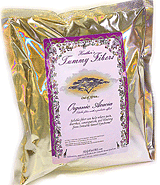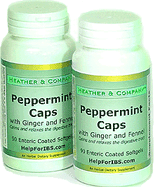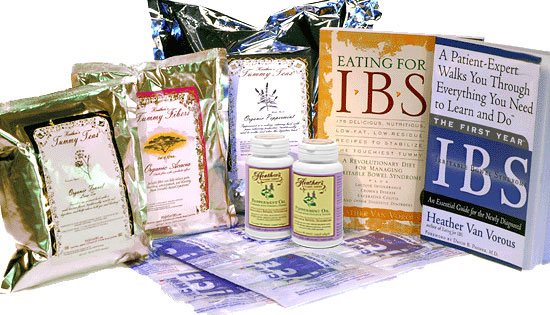| |

Did your email mangle this newsletter? Copy and paste this address into your browser window:
http://www.helpforibs.com/news/newsletter/anck122804.html or go here to see it online.
December 28, 2004
Only 3 Days Left - Special Holiday Sale on IBS Self-Hypnosis Audio Program!
Hello to everyone -
If you missed last week's newsletter, we have a special holiday sale on Michael Mahoney's IBS Audio Program 100™ through December only. If you've been considering self-hypnosis for IBS but have been struggling with the price, I hope this sale allows you to treat someone (or yourself) to one of the best presents ever - the much-deserved gift of better health. We also had Michael as a guest columnist last week, and featured the incredibly interesting story of how he came to specialize in treating IBS patients.
This week, we're taking a look at the (precious few) new IBS drugs that are available, and discussing some of the older IBS drugs as well. We've also got the latest IBS news and research. As always, we have a fabulous new digestion-friendly recipe, and this week it is absolutely one of the fastest, simplest recipes imaginable - just perfect for a last-minute New Year's Eve treat. Enjoy!
Best Wishes,
Heather Van Vorous
Did a friend send you this newsletter? Sign up here for your own free subscription.

Pineapple Angel Food Cake
Makes about 12 servings
1 19 oz. can of crushed pineapple (juice and all)
1 box of angel food cake mix
Mix the two ingredients together (include pineapple juice) according to directions on the box. DO NOT add any other ingredients that the box tells you to. Bake according to directions on cake box. Yep, that's it.
Thank you to our fabulous board moderator Alicia (Han Solo) for this incredible recipe!
For oodles of other delicious recipes, come visit the IBS Recipe Exchange board!
Are you just learning how to eat for IBS? A little intimidated at the thought of special IBS recipes? Not quite sure just what makes these recipes special in the first place? Don't worry! Come see
the IBS Diet pages, and find the answers to all your questions.

Try Organic Acacia Soluble Fiber
Acacia is a prebiotic fiber that helps global IBS symptoms, normalizes both constipation and diarrhea, and reduces bloating & gas!

 Complementary and Alternative Medicine in Gastroenterology
Complementary and Alternative Medicine in Gastroenterology
A recent study in Clinical Gastroenterology & Hepatology reviewed thousands of randomized controlled trials (RCTs) that have addressed the efficacy of complimentary and alternative medicine (CAM). The review included herbal and other natural products, acupuncture, and homeopathy, focusing on conditions of interest to gastroenterologists. Peppermint (alone or in combination) has supportive evidence for use in patients with dyspepsia, irritable bowel syndrome, and as an intraluminal spasmolytic agent during barium enemas or endoscopy. Ginger appeared to be effective in relieving nausea and vomiting due to motion sickness or pregnancy. Probiotics were useful in childhood diarrhea or in diarrhea due to antibiotics; one particular formulation (VSL#3) prevented pouchitis. Acupuncture appeared to ameliorate postoperative nausea and vomiting and might be useful elsewhere. There is even a suggestion that homeopathy has efficacy in treatment of gastrointestinal problems or symptoms.
Go here for more
information about this study...
Constipation & Laxative Use Increase Colon Cancer Risk
A study in the September 2004 issue of the European Journal of Cancer found a modest, marginally significant, association between constipation and colon cancer. It also found an increased risk between laxative use and colon cancer, agreeing with previous studies. While constipation is thought to contribute to colon cancer due to the increased the time ammonium acetate in waste has to be absorbed by the body, laxatives are thought to contribute to cancer risk because of their ingredients.
Go here for more
information about this study...
Looking for safe and healthy ways to manage constipation? Check the detailed information in
Heather's IBS Glossary
Probiotics Just As Effective As Drug for Ulcerative Colitis
An article in the November 2004 issue of Gut studied 327 inflammatory bowel disease patients for one year, with 162 receiving a probiotic (Escherichia Coli Nissle) once daily while 165 received mesalazine, a prescription drug regarded as the "gold standard" for treating Ulcerative Colitis, three times daily. Patients were assessed were regularly assessed for signs of relapse using the Rachmilewitz clinical and endoscopic activity indices, and according to histology at the end of the study. Compared to the relapses of patients on mesalazine, the probiotic group had a similar percentage of relapse. The probiotic drug E. coli Nissle 1917 showed efficacy and safety in maintaining remission equivalent to the gold standard mesalazine in patients with UC. These results re-emphasized "the pathogenetic significance of the enteric flora."
Although both groups tolerated their treatment well with no reported adverse side effects, a note of caution should be raised about mesalazine, since it has been the subject of research regarding dangerous side effects that include pancreas and kidney damage, making probiotics all the more reasonable as an effective option for Ulcerative Colitis.
Go here for more
information about this study...
Salt Intake & Smoking Play Major Roles in GERD
The usual bits of advice -- that gastroesophageal reflux disease patients give up on alcohol, coffee and tea -- may not actually be words of wisdom, according to a study published in this month's Gut. Scandinavian researchers analyzed data from two extensive public health surveys of thousands of people in Norway. They found that smoking, long considered a culprit in causing GERD, increased the risk of the disease by 70%. The use of table salt, which has never been implicated in this condition, also increased the risk by 70%. Alcohol, coffee and tea intake did not appear to make a difference. Dietary fiber and regular exercise seemed to be protective.
"The present study indicates an important role for exogenous exposures in the form of lifestyle-related factors in the etiology of GERD," wrote the authors. Heartburn experts widely praised the study for taking a closer look at the eating, drinking and other activities that may play a role in the disease's development and for suggesting a research path that might lead to prevention strategies.
Go here for more
information about this study...
Are you struggling with both GERD and IBS? Check the dietary guidelines here for help with both problems.
Looking for comprehensive IBS research and news?
Check here in the IBS Research Library!

Peppermint Oil Caps Are Amazing!
I think Peppermint Oil Caps are truly unbeatable for abdominal spasms, cramps and pain. Our caps also have fennel and ginger oils, for extra digestive benefits!
 New Drugs for IBS?
New Drugs for IBS?
"I've had the same prescription anti-spasmodic drug for IBS for over a decade - and it doesn't really work that well. Are there any new drugs on the horizon for IBS?"
Well, considering that IBS is the largest chronic health disorder in the US, and affects more people than asthma, diabetes, and depression combined, you'd think there would be quite a long list of drugs in the pipeline. In reality, there is exactly one (Cilansetron), and it's aimed exclusively at patients with diarrhea. Cilansetron may be on the market sometime in 2005, but right now it's still in clinical trials and has not been approved by the FDA as safe or effective. There isn't a great deal of information available about Cilansetron yet, but the details about Cilansetron that I do have are here. As the clinical studies progress I'll keep people posted about Cilansetron.
In general, not everyone with IBS needs (or wants) to use prescription drugs, though they can be a good weapon to have in your arsenal. Which particular drug will work best for you is something you'll most likely have to determine through trial and error. Irritable Bowel Syndrome drugs are symptom-specific (aimed at painful abdominal spasms, diarrhea OR constipation, bloating), which means they do not work on the underlying brain-gut dyfunction of IBS (only IBS hypnotherapy can do that). They are meant simply to relieve your Irritable Bowel Syndrome symptoms. If the first IBS medication you try doesn't help much (or at all), don't be discouraged – there are other options available.
Remember that there's no one particular treatment of choice for Irritable Bowel Syndrome (and no single drug is approved for all IBS symptoms) but many different medications to try. You should work in partnership with your doctor to determine which medication best fits your needs. This might take a trial period of a few months and several follow-up visits or phone calls. With any new medication, always make sure you receive the clinical insert about health risks, side effects, and possible drug interactions. You may have to specifically ask the pharmacist for this insert (it will be produced by the drug manufacturer) if you don't receive it with your prescription.
Currently, most IBS patients cite great frustration with the lack of safe, reliable and effective Irritable Bowl Syndrome therapies, and would like to see new options made available to them that would have a greater impact on their problem - especially the ability to prevent symptoms. Unfortunately for now, it's mostly a case of better something than nothing at all. So keep your fingers crossed for new treatments on the horizon.
For Irritable Bowel Syndrome Pain
The most frequently prescribed drugs for Irritable Bowel Syndrome IBS pain are Anti-Spasmodics. These drugs affect gut motor activity and reduce the colon's response to both eating and stress. Anti-spasmodics (also known as anticholinergics) have been around for many years, which means that their safety and side effects have been pretty well-established. Typically, antispasmodics are prescribed for use four times per day (before each meal and bedtime). Since they have no cumulative effect, however, many patients prefer to take them only as necessary. I have had the best luck with Donnatol - other options include Levsin, Levbid, Pro-Banthine, and Bentyl. In general, I find peppermint oil capsules far more effective than any prescription anti-spasmodic I've ever tried, and without the annoying side effects. I've actually let my prescription lapse as a result of using the peppermint caps.
Low doses of IBS-effective Antidepressants are a fairly new approach to raising the pain threshold for the painful abdominal cramps of Irritable Bowel Syndrome, and they can also either increase or decrease (depending upon the class of drug) the rate of gastrointestinal contractions as well, thus altering bowel function in either direction (and helping diarrhea or constipation). Why would antidepressants help Irritable Bowel Syndrome? These drugs are meant to affect the uptake of serotonin - a neurotransmitter directly involved in the development of clinical depression - in the brain. However, the enteric nervous system of the gut is also rich with nerves that contain large amounts of serotonin. In fact, 95% of all serotonin in the body is found in the gut, not the brain. So the effect of antidepressants on the brain is felt as a peripheral result in the gut as well.
It's important to note that the dosage of anti-depressants used for Irritable Bowel Syndrome is typically far lower than that of the drug when used for depression. It is also crucial that the doctor prescribing this type of drug be very familiar with its use for IBS, as different classes of anti-depressants have varying side effects. Some can greatly worsen, instead of help, Irritable Bowel Syndrome symptoms such as diarrhea, constipation, and pain, depending on the patient.
In particular, SSRI anti-depressants (Prozac, Celexa, Zoloft and Paxil) stimulate serotonin production and can trigger severe IBS attacks in diarrhea-predominant patients, but they may be helpful for constipation. Conversely, tricyclic anti-depressants (such as Elavil) have the best track record of success for reducing diarrhea-predominant IBS symptoms, but patients with constipation are usually not treated with these drugs because of the possibility of exacerbating this symptom. Tricyclic anti-depressants tend to be anticholinergic – that is, they block the activity of the nerves responsible for gut motion. The long-term consequences of taking low-dose anti-depressants for Irritable Bowel Syndrome are unknown, and this is a matter that should be discussed with your physician.
Drugs For Irritable Bowel Syndrome Diarrhea
The newest drug on the market for diarrhea is Lotronex, a potent and selective 5-HT3 antagonist that was meant to be prescribed just for women with diarrhea. Lotronex was pulled off the US market after killing several women, and then was re-introduced. If you're considering taking this drug for Irritable Bowel Syndrome diarrhea, it's not a bad idea to get as much information as possible before you make a decision.
Drugs For Irritable Bowel Syndrome Constipation
There are no long-established prescription drugs for constipation-predominant IBS. The use of chemical laxatives (such as Milk of Magnesia or ExLax), which tend to stimulate the bowel by causing an irritated lining, is not recommended as they can easily lead to dependency and they're harmful to the colon. The newest option is Zelnorm, which is approved for short-term use in constipation-predominant women only. Zelnorm is not to be prescribed to women with diarrhea-predominant Irritable Bowel Syndrome, or to men. The long-term safety and effectiveness of Zelnorm has not been established, and the FDA issued a warning about Zelnorm earlier this year.
Obviously, there is still a tremendous need for safe and effective drugs for IBS, and unfortunately it doesn't look like we'll be given a wealth of options anytime soon. The good news is that for many people, IBS symptoms can be controlled or even eliminated through non-drug options, and there are a great many choices in this area. Diet, gut-directed hypnotherapy, herbal and fiber supplements, yoga, acupuncture, and more are all possible roads to success.
~ Heather

Shop at Heather's Tummy Store for IBS
The only store that's just for IBS - so we only carry the very best
 Heather & Company for IBS, LLC is dedicated to serving people with Irritable Bowel Syndrome. Our mission is to provide education, support, and products that allow people with IBS to successfully manage their symptoms through lifestyle modifications.
Heather & Company for IBS, LLC is dedicated to serving people with Irritable Bowel Syndrome. Our mission is to provide education, support, and products that allow people with IBS to successfully manage their symptoms through lifestyle modifications.
We offer extensive information and tangible help for IBS, including the world's best-selling and best-reviewed books for the disorder. We provide the internet's top IBS web site resources; a twice-monthly IBS Newsletter; seminars and classes; dietary brochures for patient distribution by health care professionals; an IBS Research Library; and Heather Cooks!, a healthy cooking show on Seattle television. Much of our work is based on Heather's development of the first and only comprehensive IBS dietary guidelines and recipes, an achievement which has earned numerous awards and accolades as well as thousands of thank you letters from IBS sufferers.
Heather & Company also provides the only patient-expert moderated IBS Message Boards on the internet with forums for diet, recipes, hypnotherapy, yoga, plus Crohn's and Colitis. In addition, we support and coordinate the formation and continuation of local in-person IBS support groups across the USA, Canada, the UK, Australia, and New Zealand. We will soon have other IBS services and products available.
Our website receives nearly 3 million visits each year, and our newsletter is sent to over 29,000 people. We are regular exhibitors at the Digestive Disease Week and American Dietetic Association conferences.
Sponsorship opportunities are available for the message boards and this newsletter for companies and/or products that have been legitimately established as helpful for digestive disorders.
Please contact us for information.

You are receiving this email because you have expressed interest in IBS news and information.
To unsubscribe from Heather's IBS Newsletter, go here http://www.helpforibs.com/news/unsub.asp or send an email to help@helpforibs.com.
Change your newsletter email address here.
If you are viewing this newsletter on a website and would like to subscribe for email delivery, please "Join the IBS Newsletter" here.
ANTI-SPAM PRIVACY & SECURITY POLICY
LEGAL DISCLAIMER - This email is not intended to replace the services of a physician, nor does it constitute a doctor-patient relationship. Any application of the recommendations in this email is at the reader's discretion. Heather Van Vorous and Heather & Company for IBS, LLC are not liable for any direct or indirect claim, loss or damage resulting from use of this email and/or any web site(s) linked to/from it. Readers should consult their own physicians concerning the recommendations in this email.
HelpForIBS.com
Heather & Company for IBS, LLC
80 S. Washington St, #304
Seattle, WA 98104 USA
© 2004 Heather & Company for IBS, LLC. All rights reserved.
|
|
|